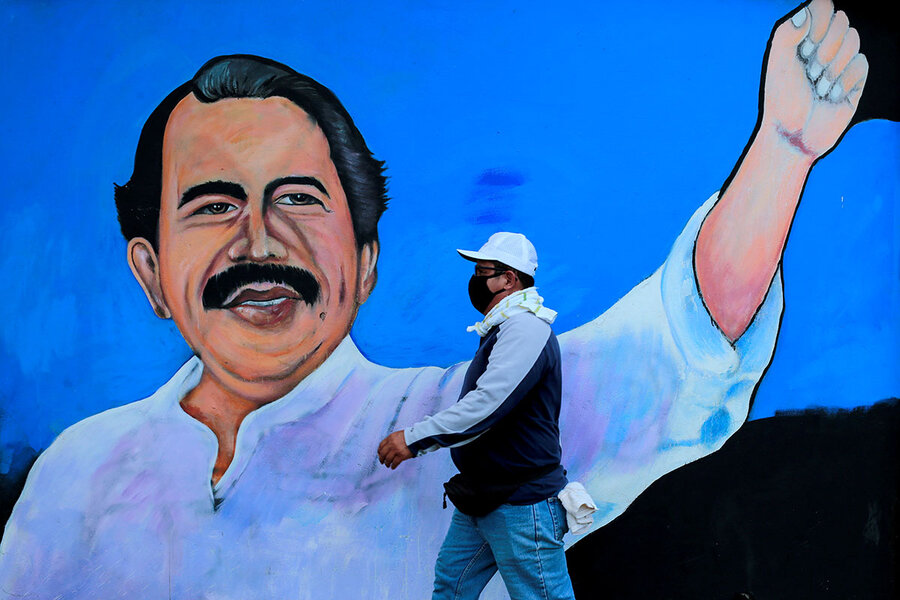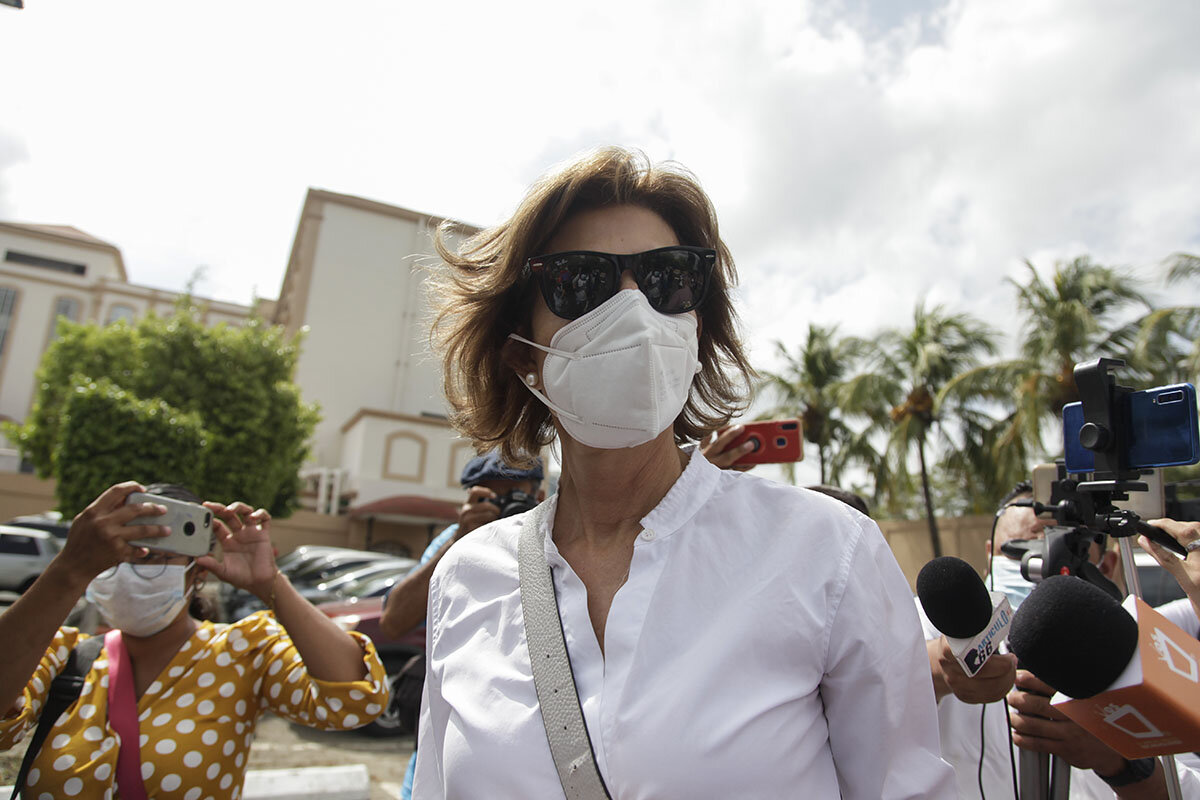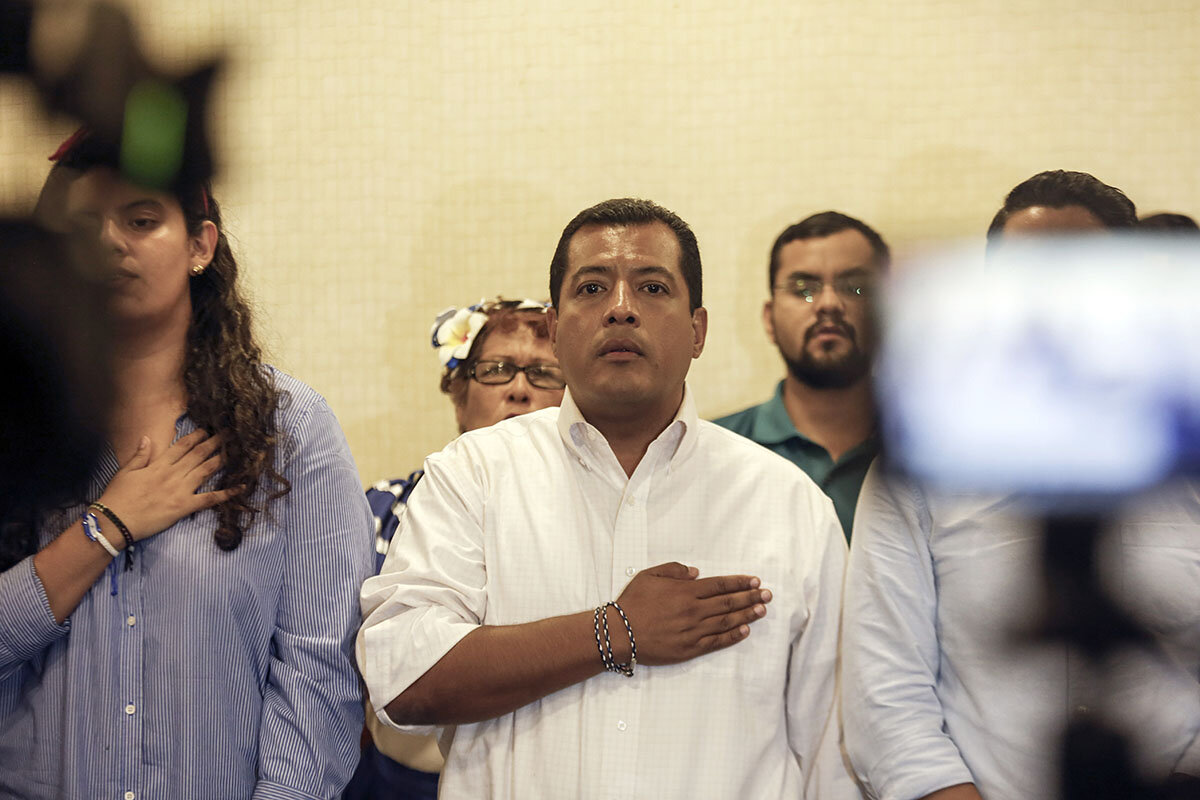Nicaraguans sound alarm over declining democracy. Who’s listening?
Loading...
| Mexico City
A former first lady. A leading independent journalist. Prominent business leaders. Five presidential hopefuls.
Over the past month, Nicaraguan officials and police have intimidated, detained, and put under house arrest more than a dozen high-profile critics. It’s drastically deepened an already widespread chill on willingness to speak out against the authoritarian government of Daniel Ortega, whose Sandinista National Liberation Front (FSLN) is vying to extend its time in office in November presidential elections.
Observers agree there’s likely a combination of factors motivating the government to up the ante: upcoming elections; the possibility of a long-expected transition of power from Mr. Ortega to his wife, Rosario Murillo; and a pandemic that’s distracted much of the international community from human rights abuses and new laws that give the guise of legal cover to this crackdown.
Why We Wrote This
Nicaragua’s president has been shrinking space for opposition for years, but especially now, amid the pandemic. After looking away for so long, can the global community still step in?
“These have been days of terror. People are just glued to Twitter trying to figure out who has been arrested, who has been detained, and who might be next,” says Mateo Jarquín, an assistant professor focusing on Latin America at Chapman University in California. Homes have been ransacked, relatives of targets have been threatened, and powerful critics are leaving the country in anticipation that they might be next.
The international community is taking note. Last week, the Organization of American States condemned the government’s actions, calling for the immediate release of political prisoners. Argentina and Mexico recalled their ambassadors this week. Human Rights Watch put out a report Tuesday calling for increased pressure from the United Nations. Earlier this month, the United States enacted additional sanctions against Mr. Ortega’s daughter and a handful of top Sandinista party officials and said it will review trade relations if elections aren’t free and fair.
But with Nicaragua’s long track record of crackdowns on human rights and freedom of expression, few have a clear idea of who – or what – will help Nicaragua change course. The fragmented opposition has struggled to inspire hope. The country has suffered loss of life – and livelihoods – during the pandemic. And after the violent crackdown on largely youth-led protests in 2018, few see internal avenues to challenge the government.
“What’s happening isn’t new; this has been going on for more than 10 years. But the global community hasn’t had its eyes fixed on Nicaragua” until this month, says Martha Patricia Molina, a lawyer who works with Nicaragua’s Pro-Transparency and Anti-Corruption Observatory. “We’ve been documenting and denouncing the same kinds of human rights violations and arbitrary detentions among citizens for years. Now, the government’s touching people with more relevance at a national and international level, and the impact at the global level is stronger.”
“It’s what Ortega says”
Jairo Videa, co-founder of the independent news site Coyuntura, found himself fleeing Nicaragua for the second time earlier this year. He’s just 24 years old.
“The persecution and attacks on my outlet have been constant,” says Mr. Videa, who continues to cover Nicaragua from exile. In February, he was physically attacked and had his phone taken on the street. The next day his computer stopped working, possibly hacked. Within 24 hours he was planning his next departure – to Spain, where he was admitted to a writing program for journalists facing threats and persecution in their home countries.
“Working as an independent journalist in Nicaragua is like a game of Russian roulette. You don’t know when the police or paramilitaries will come knocking on your door,” he says.
Even leaving Nicaragua was a challenge – from the Health Ministry’s refusal to give him needed paperwork, to police and questioning at the international airport.
“Independent institutions don’t exist in Nicaragua,” says Ms. Molina. “There’s no division of power or checks and balances. ... It’s what Ortega says that goes.”
Mr. Ortega won office in 2007, after serving a separate presidential term from 1984 to 1990. Late last year, the National Assembly passed a series of laws restricting freedom of expression and giving his government greater control over the electoral process. One measure allows candidates to be barred from elections if they speak in favor of U.S. sanctions. Others make it easier to prosecute people for receiving foreign funding or leaking “false” information. Rights groups inside the country report that at least 124 people perceived as critics are under arbitrary detention.
The government succeeded in “formally criminalizing various forms of dissent and civil society activity, labeling it money laundering, treason, conspiracy,” says Dr. Jarquín. “Clearly we didn’t pay enough attention to that at the time [in the midst of the pandemic]. ... And now we see how efficient the state has been in using these laws to speed up detentions. It helps them communicate a narrative to their base. It’s a very cynical narrative, but it’s coherent: ‘These people are laundering money. They received it from the U.S. and they send it to all their friends and NGOs to make themselves rich. They go to the U.S. and ask for sanctions. They’re clearly treasonous.’”
Pressure from abroad?
Mr. Ortega’s party maintains about 25% popular support, according to a CID Gallup poll released in February. Dr. Jarquín says the opposition’s failure to propose a coherent alternative explains FSLN’s ongoing support – though he adds that it’s never too late to come together.
And although multilateral pressure on Nicaragua is important, he says, “if you’re going to pressure the regime, you need to create incentives for democratic opening,” which he doesn’t see amid the current barrage of sanctions and removing ambassadors.
Ms. Molina says the international community has a fundamental role to play, starting with sanctions – preferably against individuals, so that normal citizens are spared increased economic difficulties. Nicaraguans, she says, can no longer do much.
“As a Nicaraguan, if we raise our voice at this point, it means jail, it means torture, it means violations of our rights,” Ms. Molina says. She’s currently outside the country and says that’s the reason she feels comfortable speaking openly about the situation. Repeated interview requests by The Christian Science Monitor to analysts, academics, and journalists inside Nicaragua were declined due to the personal risks involved.
There are risks for the international community in not taking action: increased migration, for example (some 108,000 Nicaraguans have fled since the 2018 crackdown, according to the U.N. refugee agency), and a further weakening of democracy not only in Nicaragua, but also in the region.
“The consolidation of a dictatorship in Nicaragua is both part of the Latin American erosion of democracy, but also one that really contributes to it,” says Dr. Jarquín, who says neighboring countries like Honduras, Guatemala, and more recently El Salvador have been slow to condemn Mr. Ortega’s actions because they’re busy taking notes, condemning their own nations’ civil society groups as working against the state.
Nicaraguans are looking for glimmers of hope where they can find them. For Ms. Molina, it’s youth. “We’re coming at politics with a different mentality than our predecessors. We’re more informed. We aren’t passive citizens,” she says.
Mr. Videa, the young journalist, chuckles when he says it’s his own dreams that give him hope. “My hope is myself. I want a future, I want to be a professional, I want a home, and to build my team writing independent news stories.”
Dr. Jarquín says that, as an academic, he’s less inclined toward optimism. But “repression is expensive, and it creates problems and it creates resentment,” he adds. “You can’t do it forever.”








